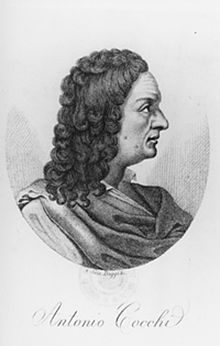Antonio Cocchi (3 August 1695 – 1 January 1758) was an Italian physician, naturalist and writer. He was best known for his work on anatomy.[1]
Antonio Cocchi | |
|---|---|
 | |
| Born | 3 August 1695 |
| Died | 1 January 1758 (aged 62) |
| Nationality | Italian |
| Occupation(s) | Physician Naturalist Writer |
| Known for | Anatomy, vegetarianism |
Biography
editCocchi was elected a Fellow of the Royal Society in 1736, his candidature citation describing him as "a very noted & Skilfull (sic) Physician at Florence, and formerly Professor of Physic and Philosophy in the University of Pisa, desirous of being elected into this Honourable Society; he is a Gentleman of very distinguished merit both in his profession and all other parts of Natural & Philosophical Learning; he is the Author of Several Books and is now publishing some Greek Medical Writers never before printed from the MSS in the Laurentian Library; he is also at this time Secretary to a Society newly Set up at Florence very much on the Same foot as the Royal Society is here" [2]
Cocchi spent three years in England, where he knew Isaac Newton. Although offered a position by the Princess of Wales, he returned to teach in Tuscany.[3]
Cocci was also a classical scholar, producing the first edition of the Ephesian Tale, a novel by Xenophon of Ephesus, as well as other work on Greek romances. His Discorso primo sopra Asclepiade (1758), on Asclepiades of Bithynia, appeared also in his collected Opere (1824).[4] Elizabeth Rawson called the Discorso "learned and often penetrating, though over-enthusiastic about his subject's moral virtues."[5]
Cocchi's writing style was characterized by purity of diction, and in his own time was regarded as a model for scientific writing.[5]
Vegetarianism
editCocchi was a vegetarian and was influenced by Pythagoras.[6] He authored the book Del vitto pitagorico per uso della medicina in 1743. It was translated by Robert Dodsley into English as The Pythagorean Diet in 1745.[6][7][8] Voltaire admired the book.[9]
Cocchi documented the health benefits of a vegetable diet. He was the first to argue that scurvy may occur from lack of vegetables in the diet.[6]
Selected publications
edit- Del vitto pitagorico per uso della medicina (1743)
- Dell'anatomia. Firenze: Giovanni Battista Zannoni. 1745.
- Du Regime De Vivre Pythagoricien à l'usage de la Médecine (1750)
- Consulti medici. Vol. 2. In Bergamo: Vincenzo Antoine. 1791.
- The Life of Asclepiades, London: T. Davies, 1762.
References
edit- ^ Santi, Raffaella; Conti, Andrea A.; Nesi, Gabriella (2011). "What a pity the master cannot admire his pupil's work: the autopsy of the anatomist Antonio Cocchi (1695-1758) performed by his pupil Saverio Manetti". Cardiovasc. Pathol. 20 (4). United States: 238–41. doi:10.1016/j.carpath.2010.05.002. PMID 20619688.
- ^ "Library and Archive Catalogue". Royal Society. Retrieved 2012-03-17.
- ^ Elizabeth Rawson, "The Life and Death of Asclepiades of Bithynia," Classical Quarterly 32.2 (1982), p. 361.
- ^ Rawson, "Asclepiades," p. 361. An English translation was made in 1762, and the work can be found in English also in R.M. Green, Asclepiades: His Life and Writings (1955).
- ^ a b Rawson, "Asclepiades," p. 361.
- ^ a b c Preece, Rod. (2008). Sins of the Flesh: A History of Ethical Vegetarian Thought. UBC Press. pp. 174-175. ISBN 978-0-7748-1509-3
- ^ Rousseau, George Sebastian. (1991). Enlightenment Borders: Pre- and Post-modern Discourses: Medical, Scientific. Manchester University Press. p. 301. ISBN 0-7190-3506-6
- ^ Gentilcore, David. (2010). Pomodoro!: A History of the Tomato in Italy. Columbia University Press. pp. 39-40. ISBN 978-0-231-15206-8
- ^ Albala, Ken. (2002). Insensible Perspiration and Oily Vegetable Humor: An Eighteenth-Century Controversy over Vegetarianism. Gastronomica 2 (3): 29-36.